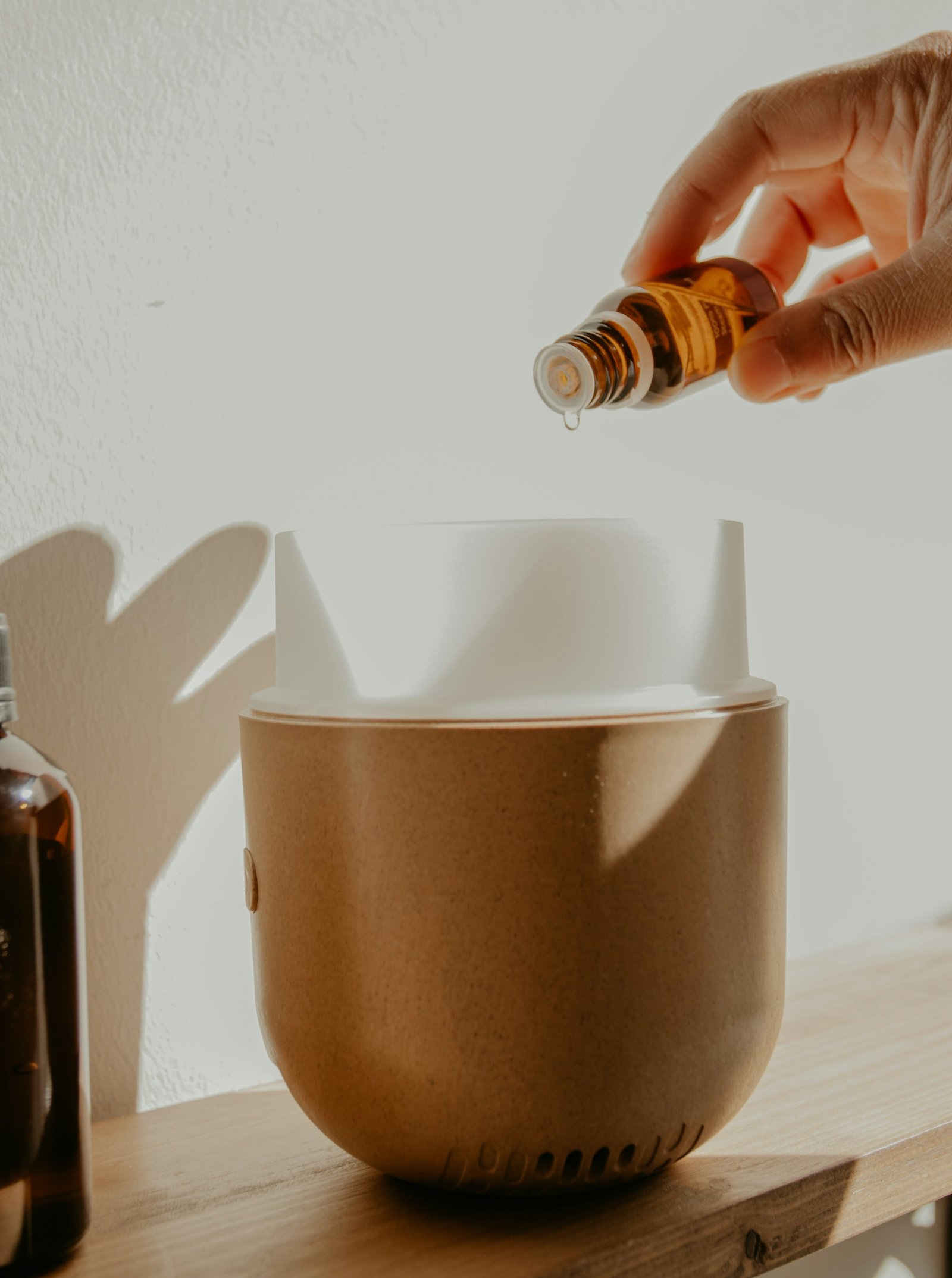Essential oils have been used since time immemorial. Often referred to as aromatherapy. Having health benefits and the ability to improve air quality. If you have a strong odor and want to mask or remove it, a few drops of essential oil in a diffuser usually, do the trick.
What are Diffusers
A diffuser paid link is a device to help you quickly disperse essential oil in a room.

It is not a humidifier the levels of moisture it disperses throughout the room are much smaller. But it can be used as a humidifier if you want a small amount of moisture.
There are 2 types of humidifiers warm and cool mist.
Many humidifiers today have an essential oil option for fragrance. But, the amount of fragrance/aroma dispersed is small compared to a diffuser.
Another diffuser option is waterless diffusers paid link. And yes, there is no water used. Insert a bottle of essential oil, or pour into the included bottle. Set the timer for the number of seconds on and off. Then just let it run. Diffusers of this type tend to have a stronger aroma because you’re using only essential oil. No, water to dilute the concentration.
If you have no experience with this type of diffuser you may want to take it easy initially. Start, with the lowest setting so you don’t make the aroma so intense it becomes uncomfortable. Some models even have a feature allowing for 2 bottles of oil. You can arbitrarily switch between oils.
Waterless diffusers tend to be more expensive upfront and over time. Initial costs for the device are close to $30. But these models tend to use up a lot of essential oil quickly. If you use it for hours at a time daily or for most of the day, it’s costly. These machines can range in size from small to large. Larger models tend to cost more. That can run into hundreds of dollars. So, this would be a more high-end machine, used for large areas.
Table of Contents
- What are Diffusers
- Which Essential Oils Remove Odor
- Do Essential Oils Improve Air Quality
- Are Essential Oils and Diffusers Safe
- Do Essential Oils Have Antimicrobial Properties
- In conclusion
Which Essential Oils Remove Odor
Essential oil aromas come in many intensities. This can be from very mild to more intense. Which version you use will depend on how offensive the odor is.
Some of the more strongly scented oils that are effective at removing bad odors are:
- Patchouli
- Eucalyptus
- Tea Tree
- Clove Bud
- Sandalwood
If I had to choose one of the most powerful essential oils for odor removal I would have to put patchouli at the top of my list. It is a beast and very effective.
Follow the instructions for your essential oil and diffuser size. We won’t discuss oil drops and combinations here.
Always check with your doctor before diffusing/using essential oil. Not everyone can use them. Some may have pre-existing conditions that make them allergic/sensitive, especially to certain oils.
Do Essential Oils Improve Air Quality
Essential oils do not improve air quality like an air purifier would. It does not filter out dust, pollen, and other airborne particles. But there have been some studies that seem to suggest that essential oil vapors do have antifungal and antimicrobial properties.
So, in that sense, it does improve air quality.
Are Essential Oils and Diffusers Safe
The question as to whether essential oils in diffusers are safe one would have to ask what is in the oil being diffused. Not all oils are 100% natural and some contain unsafe ingredients. This can be harmful particularly if inhaled regularly.
In the scientific community, there is great concern over volatile organic compounds or VOCs found and the ability of these compounds to harm.
This would include artificial ingredients like synthetic additives or fillers.
An opposing idea comes from the non-scientific community who have experienced health benefits from these oils when diffused.
I am sure the debate will continue for many years into the future. It already has.
Do Essential Oils Have Antimicrobial Properties
Although there is much resistance in the scientific community on diffusers to disperse essential oils and their safety. There seems to be agreement on the ability of certain essential oils to provide antimicrobial properties. for example: thyme essential oil. Results from that study are here:
Certain oils have long been used in cleaning solutions to disinfect surfaces.
There are some promising results from studies exploring the anti-inflammatory properties of essential oils in lung research.
This supports the concept that certain essential oils relieve coughs and other respiratory issues.
But a word of caution, there is no one size fits all and essential oils are not regulated with the same level of restrictions as pharmaceuticals. The type of regulation will depend on how the oil is used.
Be mindful of essential oils and discuss with your doctor if you have any of the following medical conditions:
Irregularities of blood pressure (high or low)
Respiratory issues
Pregnancy
Seizures
In conclusion
Diffusers can improve air quality. In this sense, some essential oils can disinfect harmful bacteria and microbial growth as oils disperse through the air.
Again, diffusers do not work like an air purifier would. The filter traps particles rendering certain substances no longer able to harm.
Not all essential oils are equal in quality and some are less than 100% pure containing additives and artificial ingredients that are harmful when inhaled
